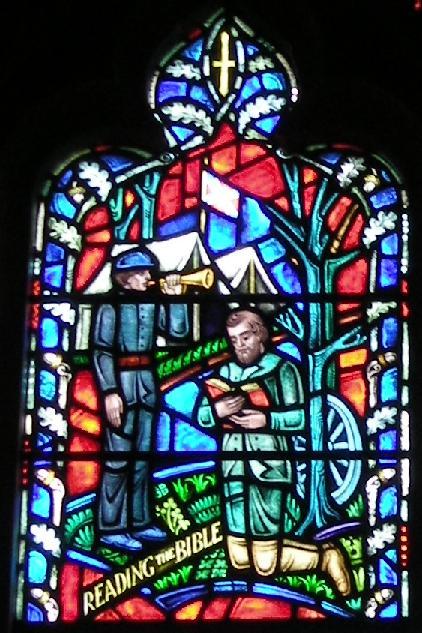Soldier of Prayer
10 May 1863

National Cathedral
See all four frames of the window
Stonewall Jackson
Soldier of Prayer
10 May 1863

National Cathedral
See all four frames of the
window
Thomas J. Jackson was a Christian General of the first order. He is broadly acknowledged to be the finest light-infantry officer of his era. He was perhaps the most aggressive battle commander of the War Between the States, and his campaign in the Valley was miraculous. His infantry moved as if they were cavalry, for which they earned the name, Jackson's "Foot Cavalry."
Jackson distinguished himself in the Mexican American War as an Artillery Officer. He entered as a brevet 2nd Lieutenant having graduated from West Point, and earned two promotions (matched only by R. E. Lee). During the American War Between the States, Jackson was a much-admired officer who drove his men to their limit, and would not tolerate cowardly behavior nor desertion. Jackson was a bit eccentric. He was known by his cadets before the war, and his soldiers during the war, as "Old Tom Fool". Like the servant in Isaiah, his appearance was unimpressive and he was humble. He treated all honorable men, regardless of race or occupation, with respect. One could observe him on the streets of Lexington, Virginia, where he taught at the Virginia Military Institute, to salute the black citizens in passing with a tip of the hat. He had his gentle side as well, and it was to be observed in his relationship with his wife, and others, especially little six-year-old Janie Corbin.
Jackson was a devout Christian. He came to Lexington as an Episcopalian, but joined the Presbyterian Church in 1851. He was a respected churchman and was elected a deacon. Jackson held strong beliefs about predestination and evangelism. In his evangelical works, he started a Sabbath School for slaves and freedmen, and defied the law by teaching them to read. The school continued after Jackson had left for the war and from it came three black congregations.
His strong beliefs in God’s providence emboldened him on the battlefield; he was an intrepid officer. He once said, "My religious belief teaches me that I am as safe in battle as in bed. God has fixed the time of my death. I do not concern myself about that, but to always be ready, no matter when it may overtake me. That is the way all men should live, and then all would be equally brave."He gave all the credit of his victories to God, and asked for the prayers of his friends and family to strengthen the army and his corps. He accepted his defeats and setbacks as the will of God. To his wife he wrote, "Our Lord has again thrown His shield over me." He acknowledged his debt to Almighty God, and asked his entire command to give "thanks to the Most High for the victories with which He has crowned our arms." His Chief of Staff, the Reverend Robert Dabney wrote, "Never has it been my happiness to know one of greater purity of life, or more regular and devout habits of prayer. As ever in his great Taskmaster’s eye, he seemed to devote every hour to the sentiment of duty, and only to live to fulfill his charge as a servant of God. Of this be assured, that all his eminence and success as a great and brave soldier, were based on his eminence and sanctity as a Christian." Jackson’s advice on living as a Christian is very similar to the motto of the Order of Centurions, (Fear God and do what is right), for he said,
"The most important thing in the world is to know the will of God, and then to do it!"
He expressed his philosophy for the Christian soldier in these words, "The Christian must carry his religion into everything. ..makes a man a better commander … teaches him punctuality, fidelity…In the commander of an army, it calms his perplexities at a critical hour." Jackson cited Joshua for the way a commander should write his battle reports saying," Look at Joshua… brevity, fairness, modesty, and he traces the victory to its proper source – the blessing of God."
Jackson was a soldier of prayer. He would often times withdraw from his staff to find a deserted place where he might commune with his Lord. The Reverend James Graham said of him, ‘"In the whole course of his prayer he did not forget for one moment that he was one of a company of sinners deserving nothing of God, yet pleading with Him, for Christ’s sake, to be merciful to us and to bless us." That habit of prayer included Evening and Morning prayer services that he personally led in his tent at headquarters, and Sabbath sermons by a "Preacher of the Gospel" whenever the situation would permit.
Jackson was wounded in the aftermath of his magnificent envelopment at Chancellorsville. General Lee wrote to him and commended him for his victory, but Jackson said, "General Lee is very kind. But he should give the praise to God." He contracted pneumonia and died some weeks later. His last words, in a state of semi-conscientiousness were, "Let us cross over the river, and rest in the shade of the trees." General Lee published General Order 61 in which he said, "The daring, skill, and energy of this great and good soldier, by a decree of all-wise Providence, are now lost to us. But while we mourn his death, we feel that his spirit lives, and will inspire the whole army with his indomitable courage and unshaken confidence in God as our hope and strength." AMEN
See the TJ Jackson VMI site here